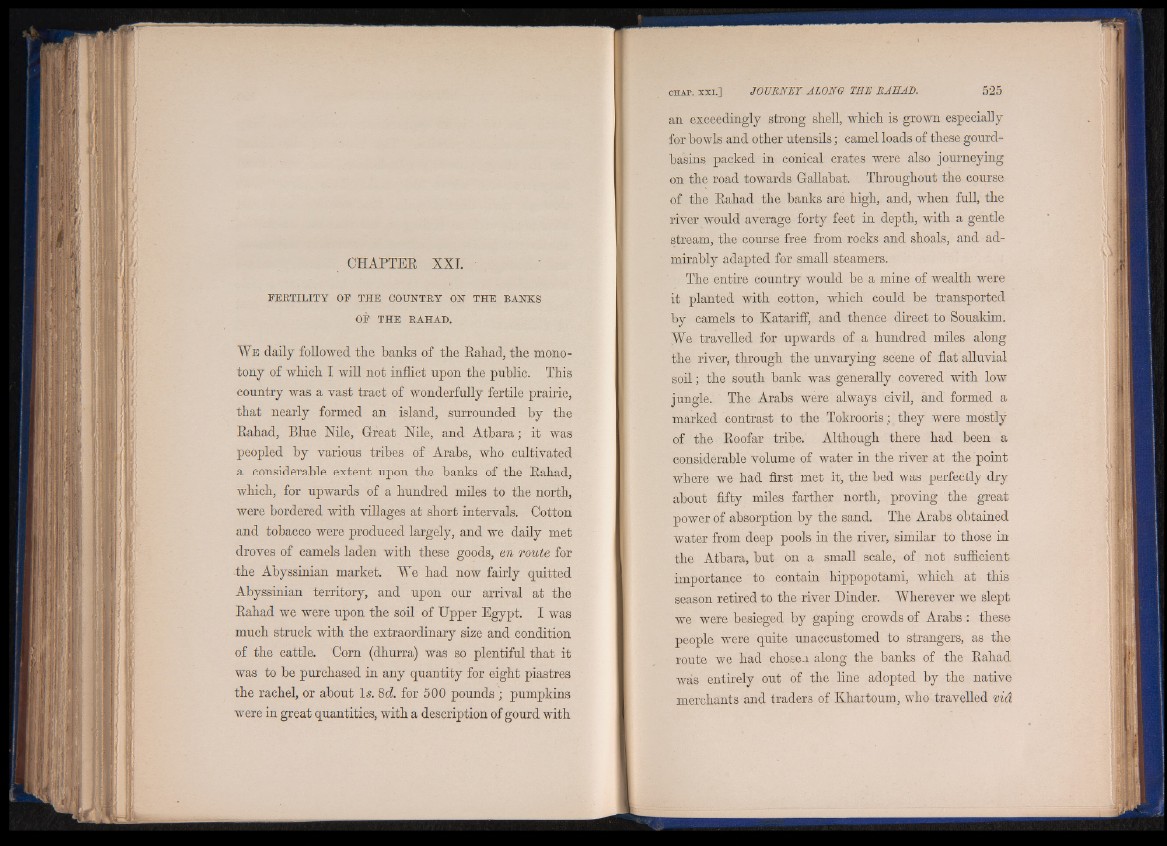
CHAPTER XXI.
FERTILITY OF THE COUNTRY ON THE BANKS
OF THE RAHAD.
We daily followed the hanks of the Rahad, the monotony
of which I will not inflict npon the public. This
country was a vast tract of wonderfully fertile prairie,
that nearly formed an island, surrounded by the
Rahad, Blue Nile, Great Nile, and Atbara; it was
peopled by various tribes of Arabs, who cultivated
a considerable extent upon the banks of the Rahad,
which, for upwards of a hundred miles to the north,
were bordered with villages at short intervals. Cotton
and tobacco were produced largely, and we daily met
droves of camels laden with these goods, en route for
the Abyssinian market. We had now fairly quitted
Abyssinian territory, and upon our arrival at the
Rahad we were upon the soil of Upper Egypt. I was
much struck with the extraordinary size and condition
of the cattle. Corn (dhurra) was so plentiful that it
was to be purchased in any quantity for eight piastres
the rachel, or about Is. 8d. for 500 pounds ; pumpkins
were in great quantities, with a description of gourd with
an exceedingly strong shell, which is grown especially
for bowls and other utensils; camel loads of these gourd-
basins packed in conical crates were also journeying
on the road towards Gallabat. Throughout the course
of the Rahad the banks are high, and, when full, the
river would average forty feet in depth, with a gentle
stream, the course free from rocks and shoals, and admirably
adapted for small steamers.
The entire country would be a mine of wealth were
it planted with cotton, which could be transported
by camels to Katariff, and thence direct to Souakim.
We travelled for upwards of a hundred miles along
the river, through the unvarying scene of flat alluvial
soil; the south bank was generally covered with low
jungle.. The Arabs were always civil, and formed a
marked contrast to the Tokrooris; they were mostly
of the Roofar tribe. Although there had been a
considerable volume of water in the river at the point
where we had first met it, the bed was perfectly dry
about fifty miles farther north, proving the great
power of absorption by the sand. The Arabs obtained
water from deep pools in the river, similar to those in
the Atbara, but on a small scale, of not sufficient
importance to contain hippopotami, which at this
season retired to the river Dinder. Wherever we slept
we were besieged by gaping crowds of Arabs : these
people were quite unaccustomed to strangers, as the
route we had chosen along the banks of the Rahad
was entirely out of the line adopted by the native
merchants and traders of Khartoum, who travelled vid